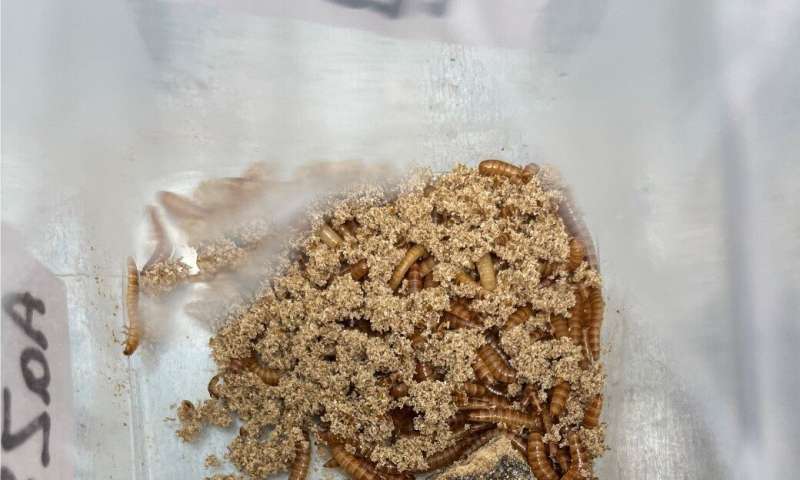A mealworm for Mars

If humans are going to live on Mars they will have to eat. It only makes sense that future human Martians will grow their own crops, so that they can have a fresh meal. The project Food For Mars and Moon (FFMM) from Wageningen University & Research has been conducting research on this topic for nearly a decade. It was always assumed that a Mars diet would be vegetarian. That was until student Lotte Bohlander had the idea to rear the lesser mealworm, consisting of high-quality protein, on organic waste products.
When crops are grown on Mars, biowaste remains. From a tomato plant only the tomatoes are eaten, and from a carrot plant only the carrot itself. For a circular system, the remains must be composted and brought back in the regolith (soil). But what if you could turn it into a high-quality food for humans? Lotte's idea was further explored: 'we work with the lesser mealworm because it grows well on vegetables. The amino acids in the plant are converted into high quality proteins, which are essential in a healthy human diet'. This is crucial for astronauts working under extreme conditions, but of course this also applies to all human beings on Earth.
A pilot experiment was carried out to explore which ingredients the larvae like best. 'The larvae were reared on carrot, carrot leaves, rye, rye leaves, maize and corncobs, among other things, to investigate if they would eat these ingredients. Based on this information, a suitable Mars diet could be prepared to feed the larvae. 'We will feed the larvae on crops grown on Mars soil simulant and compare it with crops grown on Earth potting soil', says Bohlander. If the larvae grow properly, the lesser mealworm can be a valuable supplement to the diet of a Martian.
'This research fits very well in the goal to develop a circular agricultural ecosystem for both Mars and Moon where everything has to be recycled, including waste products' according to principal researcher and space farmer Wieger Wamelink. 'The poo of the mealworms can be used as manure, although this still needs further exploration', Wamelink says.
The project will start on Wednesday 23-11-2022 and will be harvested two weeks later, on 7-12-2022.
Growing food on Mars is not easy, given the facts that there is almost no air, temperatures average around 60 degrees centigrade below zero and cosmic radiation threatening both humans as crops. This is why we are assuming that food growing will always be done indoors, comparable to city agriculture. Furthermore, it is done below ground so the Mars regolith shields against cosmic radiation. This will give a fully controlled surrounding with normal Earth-like air and air pressure, LED lights and a pleasant temperature of around 20 degrees centigrade. Inside, humans can walk around freely and work more easily. Additionally, growing fresh food has a positive effect on the psychological wellbeing of future Martians. Of course, resources that are available on Mars should be used as much as possible to limit the amount of cargo that needs to be brought from Earth.
Provided by Wageningen University